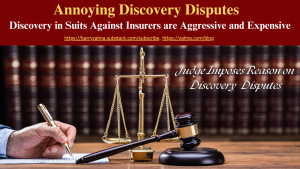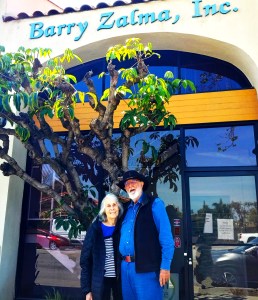ANNOYING DISCOVERY DISPUTES

Post 4837
See the full video at https://rumble.com/v57b6q5-annoying-discovery-disputes.html and at https://youtu.be/F0vcm3FcawU
The USDC conducted a discovery conference with the parties concerning their discovery disputes. Federal discovery rules are accorded a broad and liberal treatment to achieve their purpose of adequately informing litigants in civil trials. At some point discovery yields diminishing returns, needlessly increases expenses, and delays the resolution of the parties’ dispute. Finding a just and appropriate balance in the discovery process is one of the key responsibilities of the Court.
In Kwame Moore v. Western World Insurance Company, Civil Action No. 3:23-cv-3029-KHJ-MTP, United States District Court, S.D. Mississippi, Northern Division (July 12, 2024) the USDC dealt with discovery disputes between parties who could not resolve their differences.
THE DISCOVERY RULE
Federal Rule of Civil Procedure 26(b)(1) provides that: “Parties may obtain discovery regarding any nonprivileged matter that is relevant to any party’s claim or defense and proportional to the needs of the case, considering the importance of the issues at stake in the action, the amount in controversy, the parties’ relative access to relevant information, the parties’ resources, the importance of the discovery in resolving the issues, and whether the burden or expense of the proposed discovery outweighs its likely benefits.”
FACTUAL BACKGROUND
According to Defendant, “Plaintiff has failed to produce emails, text messages and other documents which Western World knows were sent to Plaintiff.” As an example, Defendant stated that in response to a subpoena, Tom Weems (a third party who provided a report to Plaintiff indicating that hail caused damage to Plaintiff’s building) produced text messages between he and Plaintiff, which have not been produced by Plaintiff in response to requests for such information.
Plaintiff, through counsel, asserts that he has “conducted a search of his files and has no other documents to produce” and “cannot produce documents he does not have.”
Ordinarily, the representation of a party’s attorney that no additional documents exist is sufficient to defeat a motion to compel absent credible evidence that the representation is inaccurate. At this time the record does not establish that Plaintiff did or did not conduct a reasonable search. Plaintiff does not explain what efforts he made to find and produce responsive information or why responsive information he once possessed is no longer in his possession. Defendant has also not made this showing. Thus, Defendant has not demonstrated that Plaintiff is unlawfully withholding responsive information despite Plaintiff’s representations. Without more, counsel’s representation that Plaintiff does not possess responsive information is sufficient to defeat the Motion to Compel.
The denial of the Motion to Compel, however, was issued without prejudice to Defendant’s right to reassert it if Defendant can show Plaintiff possesses the information, failed to conduct a reasonable search, wrongfully disposed of the information, or otherwise violated his duties in discovery.
Defendant also requested that the Court compel a forensic examination of Plaintiff’s computers, cellphones, and mail servers. The Court found that the request is premature. If Plaintiff no longer possesses this information, the Court cannot determine whether a forensic examination is warranted. Thus, this request was denied without prejudice.
The Court also noted that Plaintiff also argued that he should not be required to produce duplicative documents which are already in Western World’s possession. However, it is not a bar to the discovery of relevant material that the same material may be in the possession of the requesting party or obtainable from another source. That Plaintiff makes this objection is curious given Plaintiff’s representations that he has no such information, duplicative or otherwise. To the extent Plaintiff is withholding responsive information based on this or any other objection, the Court grants the Motion to Compel.
On or before July 22, 2024, Plaintiff shall produce any responsive information previously withheld based on this objection or inform Defendant in writing that he is not withholding information based on this objection.
Before I retired from the practice of law I was an active insurance litigator and dealt with multiple annoying and overbroad discovery disputes designed to cost the insurer or the policyholder, rather than obtain information that would assist in the trial of the matter. The bludgeon of discovery became a weapon used to force a settlement unfavorable to the insurer or policyholder to avoid excessive attorneys fees and costs. The court tried to calm the excesses.

(c) 2024 Barry Zalma & ClaimSchool, Inc.
Please tell your friends and colleagues about this blog and the videos and let them subscribe to the blog and the videos.
Subscribe to my substack at https://barryzalma.substack.com/subscribe
Go to X @bzalma; Go to Newsbreak.com https://www.newsbreak.com/@c/1653419?s=01; Go to Barry Zalma videos at Rumble.com at https://rumble.com/account/content?type=all; Go to Barry Zalma on YouTube- https://www.youtube.com/channel/UCysiZklEtxZsSF9DfC0Expg.
Go to the Insurance Claims Library – https://lnkd.in/gwEYk
Like this:
Loading…
Related
About Barry Zalma
An insurance coverage and claims handling author, consultant and expert witness with more than 48 years of practical and court room experience.







